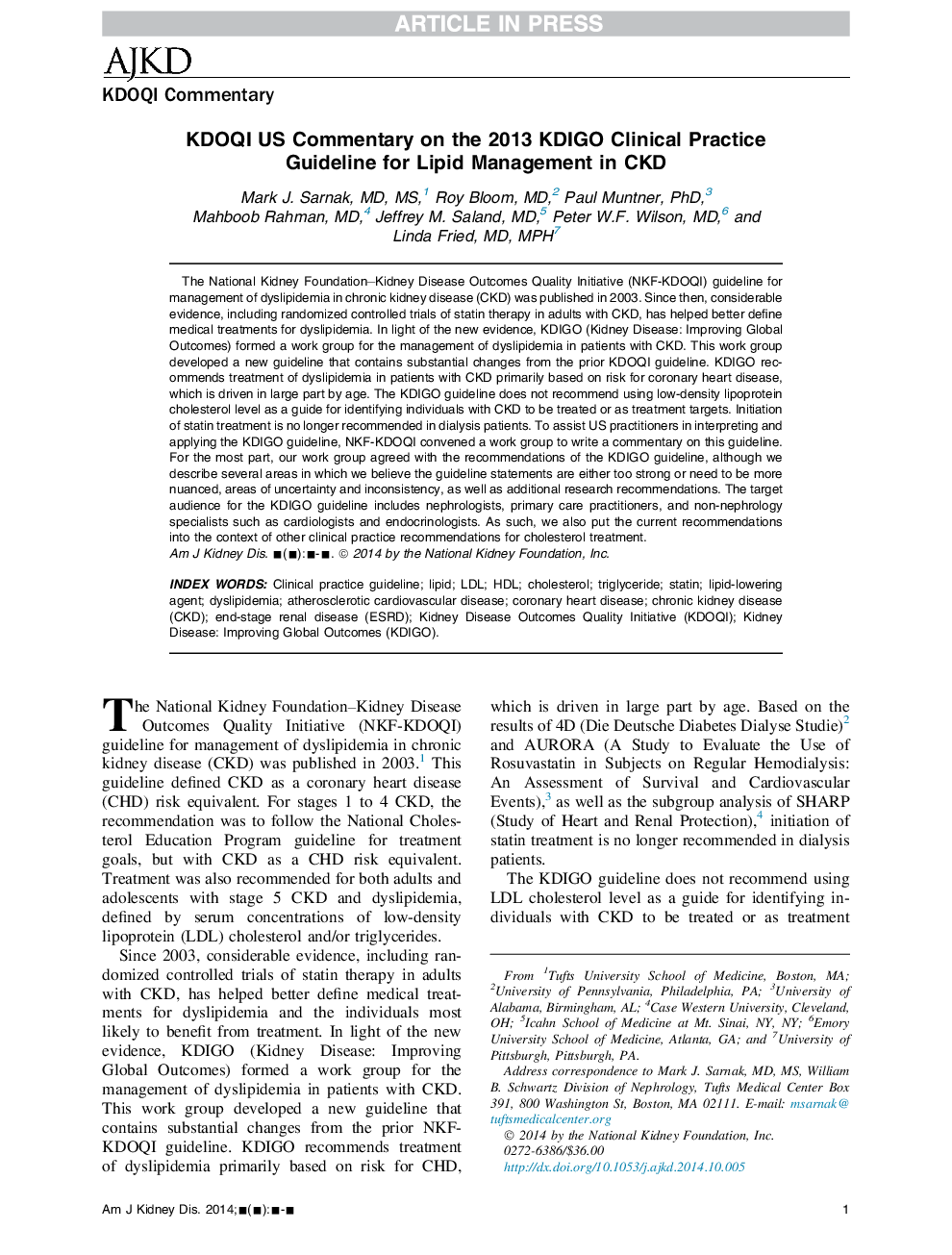| کد مقاله | کد نشریه | سال انتشار | مقاله انگلیسی | نسخه تمام متن |
|---|---|---|---|---|
| 6157249 | 1598258 | 2015 | 13 صفحه PDF | دانلود رایگان |
عنوان انگلیسی مقاله ISI
KDOQI US Commentary on the 2013 KDIGO Clinical Practice Guideline for Lipid Management in CKD
دانلود مقاله + سفارش ترجمه
دانلود مقاله ISI انگلیسی
رایگان برای ایرانیان
کلمات کلیدی
HDLKidney Disease: Improving Global Outcomes (KDIGO)Kidney Disease Outcomes Quality Initiative (KDOQI)Dyslipidemia - اختلالات چربی خون یا دیسپیدمیStatin - استاتینcoronary heart disease - بیماری عروق کرونر قلبAtherosclerotic cardiovascular disease - بیماری قلبی عروقی AtheroscleroticChronic kidney disease (CKD) - بیماری مزمن کلیه (CKD)end-stage renal disease (ESRD) - بیماری کلیوی مرحله پایانی (ESRD)triglyceride - تریگلیسریدClinical practice guideline - دستورالعمل تمرین بالینیLDL - لیپوپروتئین کم چگالی(کلسترول بد)Lipid - لیپیدcholesterol - کلسترول
موضوعات مرتبط
علوم پزشکی و سلامت
پزشکی و دندانپزشکی
بیماریهای کلیوی
پیش نمایش صفحه اول مقاله

چکیده انگلیسی
The National Kidney Foundation-Kidney Disease Outcomes Quality Initiative (NKF-KDOQI) guideline for management of dyslipidemia in chronic kidney disease (CKD) was published in 2003. Since then, considerable evidence, including randomized controlled trials of statin therapy in adults with CKD, has helped better define medical treatments for dyslipidemia. In light of the new evidence, KDIGO (Kidney Disease: Improving Global Outcomes) formed a work group for the management of dyslipidemia in patients with CKD. This work group developed a new guideline that contains substantial changes from the prior KDOQI guideline. KDIGO recommends treatment of dyslipidemia in patients with CKD primarily based on risk for coronary heart disease, which is driven in large part by age. The KDIGO guideline does not recommend using low-density lipoprotein cholesterol level as a guide for identifying individuals with CKD to be treated or as treatment targets. Initiation of statin treatment is no longer recommended in dialysis patients. To assist US practitioners in interpreting and applying the KDIGO guideline, NKF-KDOQI convened a work group to write a commentary on this guideline. For the most part, our work group agreed with the recommendations of the KDIGO guideline, although we describe several areas in which we believe the guideline statements are either too strong or need to be more nuanced, areas of uncertainty and inconsistency, as well as additional research recommendations. The target audience for the KDIGO guideline includes nephrologists, primary care practitioners, and non-nephrology specialists such as cardiologists and endocrinologists. As such, we also put the current recommendations into the context of other clinical practice recommendations for cholesterol treatment.
ناشر
Database: Elsevier - ScienceDirect (ساینس دایرکت)
Journal: American Journal of Kidney Diseases - Volume 65, Issue 3, March 2015, Pages 354-366
Journal: American Journal of Kidney Diseases - Volume 65, Issue 3, March 2015, Pages 354-366
نویسندگان
Mark J. MD, MS, Roy MD, Paul PhD, Mahboob MD, Jeffrey M. MD, Peter W.F. MD, Linda MD, MPH,